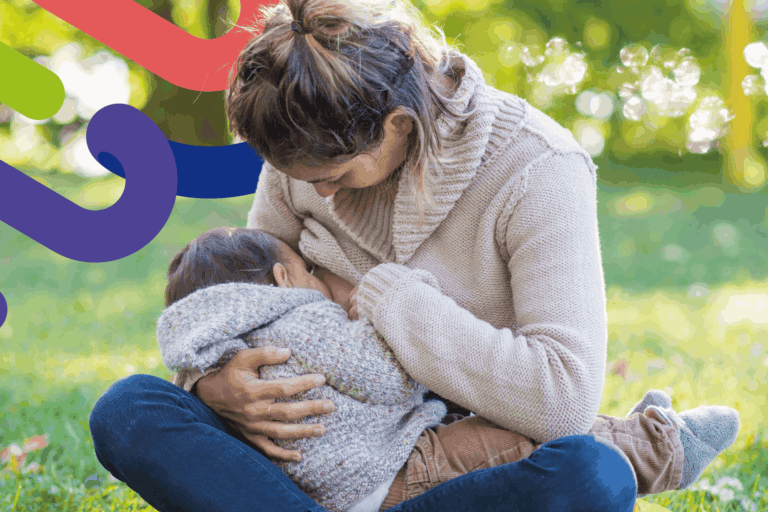In the News Building Breastfeeding Success with WIC
Hear from a WIC peer consultant and breastfeeding peer counselor about how WIC can support your breastfeeding journey!
Topics

Breastfeeding Support Starts with WIC—this National Breastfeeding Month and Beyond
On Wednesday, August 6th, the National WIC Association hosted an Instagram Live event offering a relaxed, conversational way to connect with WIC staff who have also been participants in the program.
Our panelists included:
Rachel August—a WIC and Breastfeeding Peer Consultant for the Washington State Department of Health.
Jehimy Benitez—a breastfeeding peer counselor with the Maryland CCI WIC Program. She is passionate about supporting new and expecting mothers, especially teens and young moms, through their breastfeeding journey. “As someone who was once a WIC baby and is now working in the program, I truly value the full-circle experience of giving back to my community.”
Our panelists, Rachel and Jehimy, answered questions and shared their personal stories and connections to WIC. We’re excited to highlight their experiences and advice in this blog post, along with an Instagram reel recording of the event!
WIC breastfeeding support for military families.
Rachel, can you share a little bit about your connection to WIC?
Rachel August: “We had one of our sergeants say, ‘Hey, you need to go to WIC.’ We had no idea what it was, but you know, they said to go. So we went, they're like, we think it might help. And so went to the appointment, you know, heard about it. And I think I had seen WIC around, like seeing the, the, the wording for WIC and just didn't know what it was, you know? And it's just interesting looking back. I ended up working in the same office that we had our service in on base. And I thought, how exciting would this be to help other military families, but working at WIC. So when the military service ended, they had an opening and it just worked out. But something I feel is important about WIC is that not one doctor ever mentioned it and I wish they had, because my kiddos were not infants. They were toddlers when we joined WIC, and it would have been nice to have known about it when they were infants.”
What is one thing you would say to military families who are looking to get started with WIC?
Rachel August: “I think for me, sticking with the vein of military families, I think if I could say one thing that could maybe help them or make WIC more visible, is to let them know that just try because a lot of times they they've tried other sources to try and get on programs and because of like the BAH (Basic Allowance for Housing) which helps them to pay their rent if they live on the economy. I mean, they get this extra money, but it really doesn't go to them. It's really for housing. But a lot of times people will count that and then they don't qualify or they may count their vehicle. But WIC does not look at that housing part. They're just looking at their base income. And so I think a lot of military families are not even trying because they're like, there's no way I'm going to qualify for that. And I think getting that message out demystifies WIC.”
The overarching theme of #NationalBreastfeedingMonth this year is Forward Together—what does Forward Together mean to you?
Rachel August: “I always think of Forward Together, it just means those communities that sometimes get left behind, that they're invisible, that they don't have a lot of resources. To me, that feels, okay, let's all move forward, but making sure that we're not leaving anyone behind and making sure that there's representation and global support. And I think WIC does a really good job at that. So, that's what that means to me: making sure that no one's left behind.“
WIC breastfeeding support for young parents.
Jehimy, can you share a little bit about your connection to WIC?
Jehimy Benitez: “I'm a teen mom, so I had my baby at seventeen. So going to WIC was very helpful for me, for me and my daughter, not only just for resources and the benefits, but it's where I found support, you know, like during an overwhelming time for me, just going there as a teen mom with my daughter was very like a very inspirational moment for me. So I really, really appreciated all the kindness from everyone at WIC. So being on the other side now is just, it's great. I really love doing what I do.”
What is one thing you would say to young parents who are looking to get started with WIC?
Jehimy Benitez: “Everyone was very supportive. Everyone heard my story. Nobody judged anyone. Everyone was very inclusive. So that's pretty much what is really good about WIC. It's a judge-free place. So I really like that, especially working on the other side right now. I do work with lots of young moms, lots of immigrant families. So I take the time to listen to these families. I take the time to... support these families and teach them ways that I'm able to help them, support them, resources, and be able to share with them. So I feel like that's really helped me and that's helped all these families as well.”
Can you offer some advice for breastfeeding parents who are looking to return to work?
Jehimy Benitez: “Yeah, so I get this question all the time from mommies. I'm thinking about going back to work soon. I'm only going to be at home for a month or three months. Plan ahead. So please plan ahead. Try to get information on how to store breast milk. Know your rights as well. Lots of mommies don't know their rights. So in Maryland, there is The PUMP Act that you need to have a clean space and adequate time. to be able to pump. So I think the most essential thing is to plan ahead and know your rights.”
Watch and share the post-event Instagram reel and follow us to stay tuned for future events
Follow us (@WICYouGotThis!) on Instagram and watch, or listen to, the full recording of this year’s #NationalBreastfeedingMonth Instagram Live!
Author
Mariah Cowsert
Mariah Cowsert is a Senior Communications Associate at the National WIC Association. She has 8 years of experience in public health communications with her work ranging from direct social service and affordable housing organizations in DC and her home state of Michigan, to supporting sexual and reproductive health education initiatives at a national non-profit in Baltimore. As someone who grew up in a low-income household in rural Michigan—she knows firsthand that when families have access to quality, healthy foods regardless of their income or zip code; they can not only survive but thrive.


